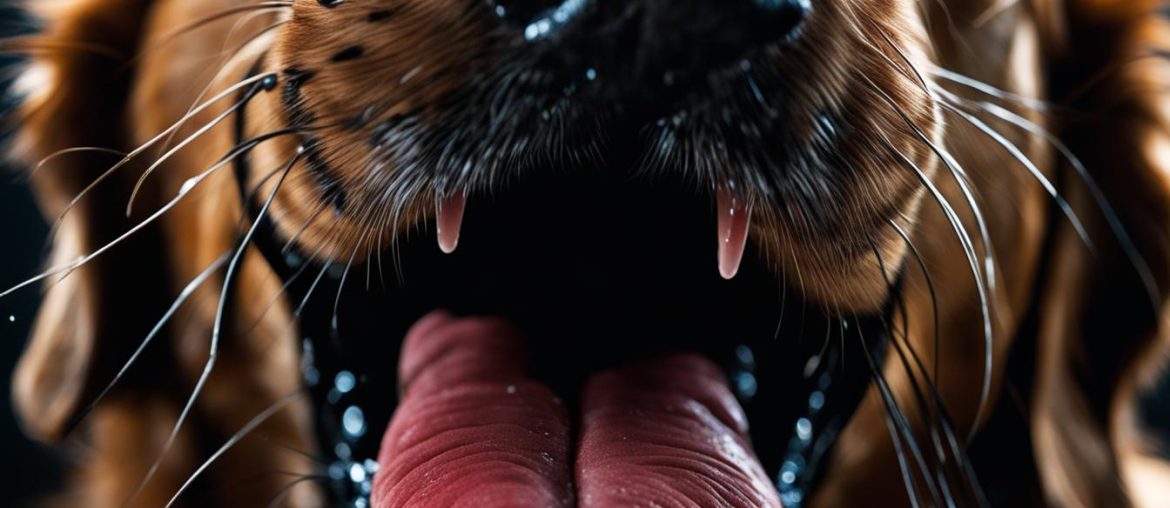As a dog owner, you may have experienced the puzzling behavior of your furry friend excessively licking you at night. This common canine behavior can have various underlying reasons, and understanding them is key to addressing it effectively. In this article, we will explore the reasons behind dogs’ excessive licking behavior, providing insights into their motivations and potential solutions.
Key Takeaways:
- Dogs may excessively lick their owners at night as a sign of affection and playfulness.
- Excessive licking can also be a way for dogs to seek attention and interaction.
- It is important to recognize the instinctual grooming behavior and the role of smell and taste in dogs’ licking behavior.
- Excessive licking at night can be a self-soothing behavior for dogs experiencing stress or anxiety.
- Setting boundaries, reinforcing desired behaviors, and providing distractions can help manage excessive licking at night.
Signs of Affection and Playfulness
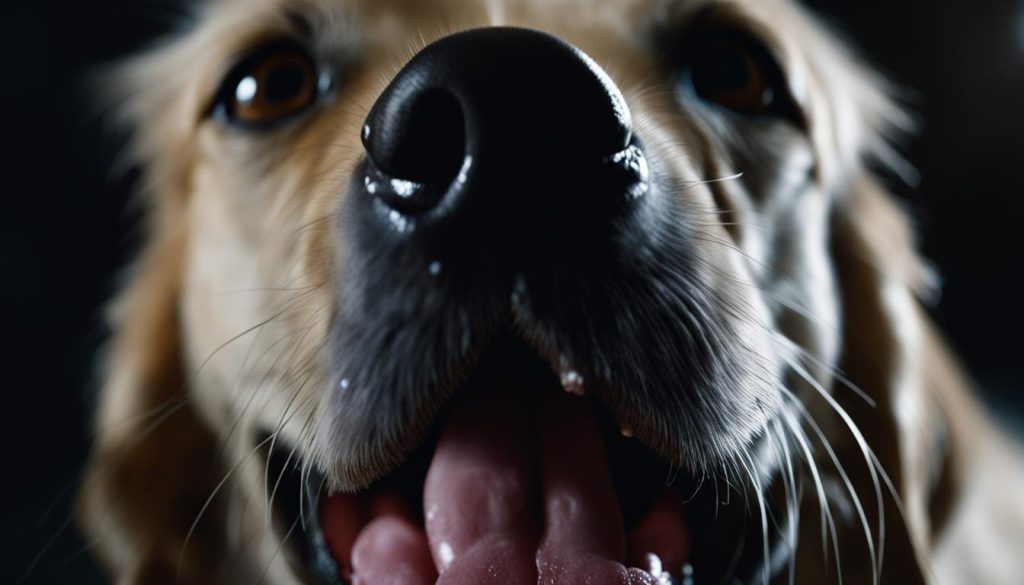
Dogs have unique ways of expressing their love and affection towards their owners, and excessive licking at night can be one of them. When a dog licks you, it’s their way of showing that they care and trust you. It’s a sign of affectionate behavior that strengthens the bond between you and your furry companion. Dogs may also lick playfully, seeking attention and interaction. This behavior is their way of expressing their playful nature and wanting to engage with you.
Recognizing these signs of affection and playfulness is important in understanding why your dog licks you excessively at night. It helps you interpret their behavior accurately, creating a deeper understanding of their unique ways of communicating their emotions.
“Dogs have a way of finding the people who need them and filling the emptiness we didn’t even know we had.”
Understanding and appreciating the signs of affection and playfulness behind your dog’s excessive licking at night can enhance your relationship with them, fostering a loving and joyful connection.
Table: Common Signs of Affection and Playfulness
| Signs | Explanation |
|---|---|
| Licking | A way to show love, trust, and care |
| Jumping or bouncing | Excitement and eagerness to play |
| Tail wagging | Happiness and anticipation |
| Bringing toys or objects | Desire for interaction and playtime |
| Play-bowing | Invitation to play and have fun |
By understanding the signs of affection and playfulness demonstrated by your dog, you can better appreciate their unique ways of expressing love and create a stronger bond between you.
Attention-Seeking Behavior
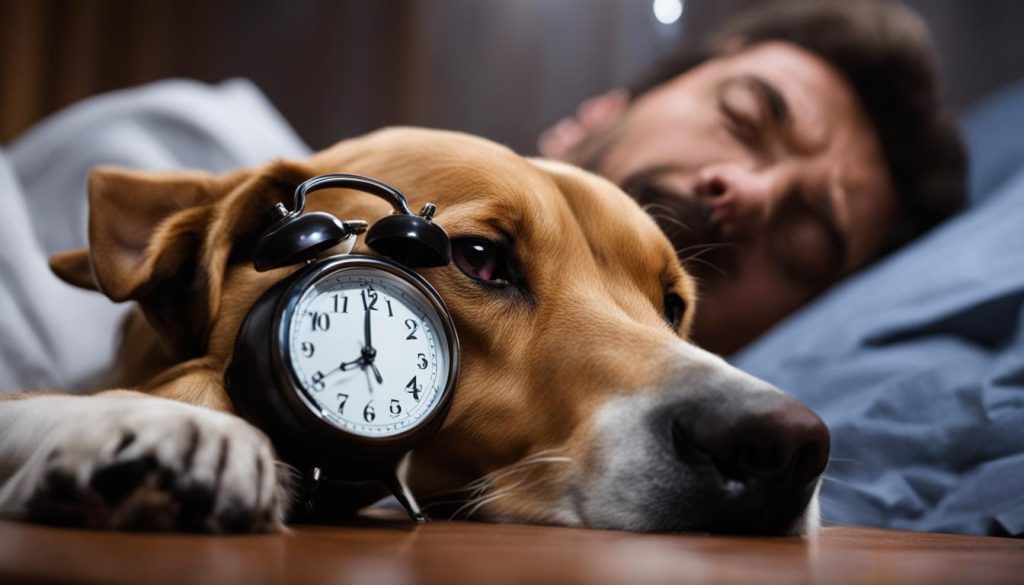
Excessive licking at night in dogs can be attributed to attention-seeking behavior. Dogs may engage in this behavior as a means to gain the attention, praise, or interaction they desire from their owners. They have learned that licking brings them closer to their humans and may continue this behavior as a result. It is important to understand the underlying motivation behind attention-seeking licking in order to effectively address and modify it.
One way to address attention-seeking licking is by redirecting the dog’s behavior. When the dog begins to lick excessively, provide a distraction or alternative activity that they can engage in instead. This can help shift their focus away from licking and onto a more appropriate behavior. For example, you can offer a chew toy or engage in a play session with them.
Consistency is key when seeking to modify attention-seeking licking behavior. Be sure to reinforce desired behaviors and avoid rewarding or giving attention to the dog when they engage in excessive licking. By setting clear boundaries and providing guidance, you can help the dog understand what behaviors are acceptable and discourage excessive licking at night.
Table: Redirecting Attention-Seeking Licking Behavior
| Method | Description |
|---|---|
| Provide alternative stimuli | Offer interactive toys, puzzle feeders, or chew toys to redirect the dog’s attention away from excessive licking. |
| Engage in play sessions | Provide regular opportunities for physical exercise and mental stimulation through interactive play sessions. |
| Use positive reinforcement | Reward the dog with treats, praise, or petting when they engage in appropriate behaviors, such as sitting calmly or playing with their toys. |
| Establish consistent boundaries | Set clear rules and expectations for behavior, and consistently enforce them to discourage excessive licking. |
By utilizing these strategies and techniques, you can effectively redirect attention-seeking licking behavior in dogs. It is important to be patient and consistent in your approach, as behavior modification may take time. If the problem persists or worsens, consulting a professional dog trainer or behaviorist can provide additional guidance and support in addressing this issue.
Instinctual Grooming Behavior
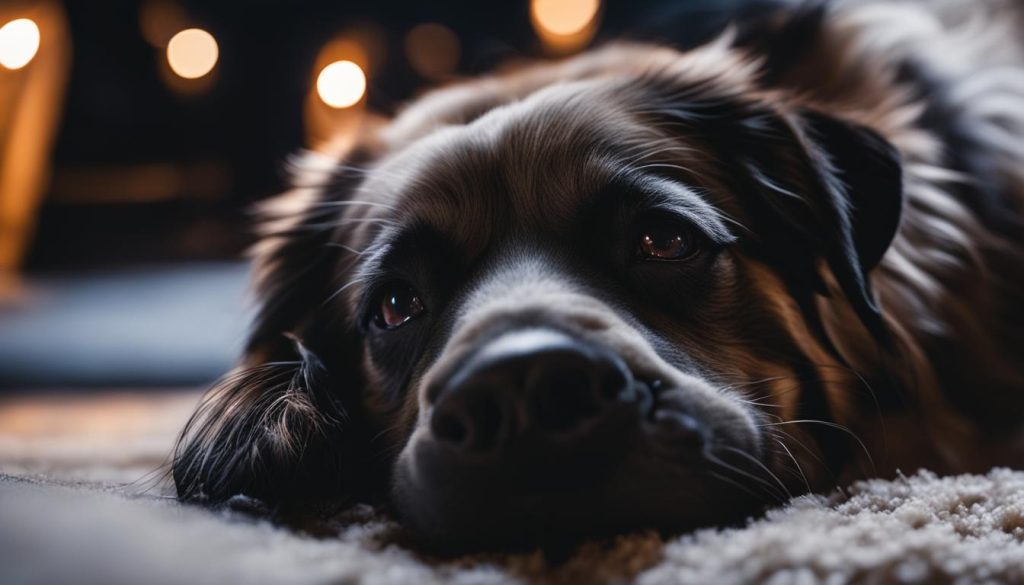
One possible explanation for why dogs lick their owners excessively at night is their instinctual grooming behavior. Dogs have an innate need to groom themselves and others as a way to establish social bonds and show care within their pack or family. By licking their owners, especially at night when they are closer and more relaxed, dogs are displaying their natural instincts.
This grooming behavior can be seen as a form of bonding and communication. Dogs use licking as a way to express affection and trust towards their human companions. It is their way of saying, “I care about you” and strengthening the emotional connection they have with their owners.
Understanding this instinctual grooming behavior is key to managing excessive licking at night. It is important to provide alternative outlets for dogs to express their grooming instincts, such as offering them appropriate toys or providing regular grooming sessions. By fulfilling their grooming needs in a controlled and balanced manner, owners can help reduce excessive licking behavior at night.
Table: Common Signs of Instinctual Grooming Behavior
| Signs | Explanation |
|---|---|
| Licking various body parts | Dogs tend to lick areas that are accessible to them, including hands, feet, and face. |
| Gentle and repetitive licking | Instead of aggressive or rough licking, dogs will usually perform slow and gentle licking motions. |
| Calming effect on the dog | Engaging in grooming behavior can help dogs relax and reduce stress or anxiety. |
| Preference for specific individuals | Dogs may show a stronger inclination to groom certain family members or individuals they have a closer bond with. |
Recognizing these signs of instinctual grooming behavior can help owners differentiate between excessive licking that stems from affection and bonding, and licking that is caused by other factors such as stress or medical issues. By understanding and addressing the underlying motivations for the behavior, owners can find effective solutions to manage excessive licking at night.
Sensitivity to Smell and Taste
Dogs have a remarkable sense of smell, and they are often attracted to various scents and tastes. When it comes to excessive licking behavior at night, dogs may be drawn to the saltiness in human sweat or the residual scents on their owner’s feet. It’s important to understand that dogs use their sense of smell as a way to gather information about their environment and establish social bonds.
By licking their owners’ feet at night, dogs may be seeking sensory stimulation and satisfaction. The taste and smell provide a form of mental and physical stimulation for them. It’s crucial to recognize the role of smell and taste in dogs’ excessive licking behavior to effectively address it.
One way to manage this behavior is by providing alternative outlets for dogs’ sensory needs. For example, engaging them in interactive play with scented toys or puzzle games can help redirect their focus from licking.
| Possible Remedies for Excessive Dog Licking at Night | Benefits |
|---|---|
| Introduce scented toys or chew treats | Provides an alternative sensory outlet |
| Engage in scent-based training activities | Channels their sensory needs in a constructive way |
| Clean and wipe down your feet before bedtime | Reduces the appeal of residual scents |
| Consult with a veterinarian or professional dog trainer | Obtain tailored guidance for managing the behavior |
By understanding and addressing dogs’ sensitivity to smell and taste, owners can effectively manage their excessive licking behavior at night and provide them with more suitable outlets for fulfilling their sensory needs.
Stress and Anxiety Relief
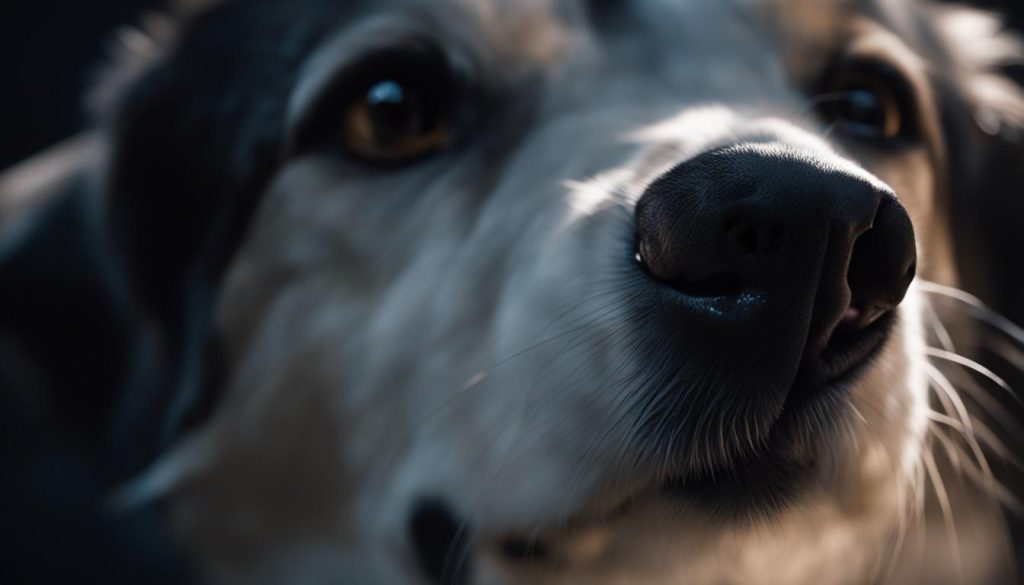
Excessive licking at night is not always a behavioral quirk; it can be a sign of stress or anxiety in dogs. Just like humans find comfort in certain repetitive behaviors when feeling anxious, dogs may resort to licking as a self-soothing mechanism. This behavior serves as a way for them to release pent-up tension and feel a sense of calm.
Recognizing signs of stress or anxiety in your dog alongside their excessive licking at night can help you provide the appropriate support and comfort. Some common signs include restlessness, panting, pacing, excessive barking, or destructiveness. If you notice any of these behaviors along with excessive licking, it’s crucial to address the underlying stressors to help your dog find relief.
There are various ways to alleviate stress and anxiety in dogs. Creating a safe and secure environment, establishing a consistent routine, and providing mental and physical stimulation through interactive toys or puzzles can help reduce anxiety levels. Additionally, incorporating calming techniques such as gentle massage or aromatherapy may also help promote relaxation. If the stress and anxiety persist, it may be beneficial to consult with a veterinarian or a professional dog behaviorist to explore further options and strategies.
The Link Between Stress and Excessive Licking
Stress and anxiety can manifest in various ways in dogs, and excessive licking at night is one such manifestation. It’s essential to understand that excessive licking is not a deliberate act of disobedience or attention-seeking; rather, it is often a reflection of an underlying emotional state.
By addressing the stressors causing your dog’s anxiety and providing appropriate support, you can help alleviate their excessive licking behavior. Remember, patience, consistency, and understanding are key when addressing stress and anxiety-related licking in dogs.
Habitual Licking
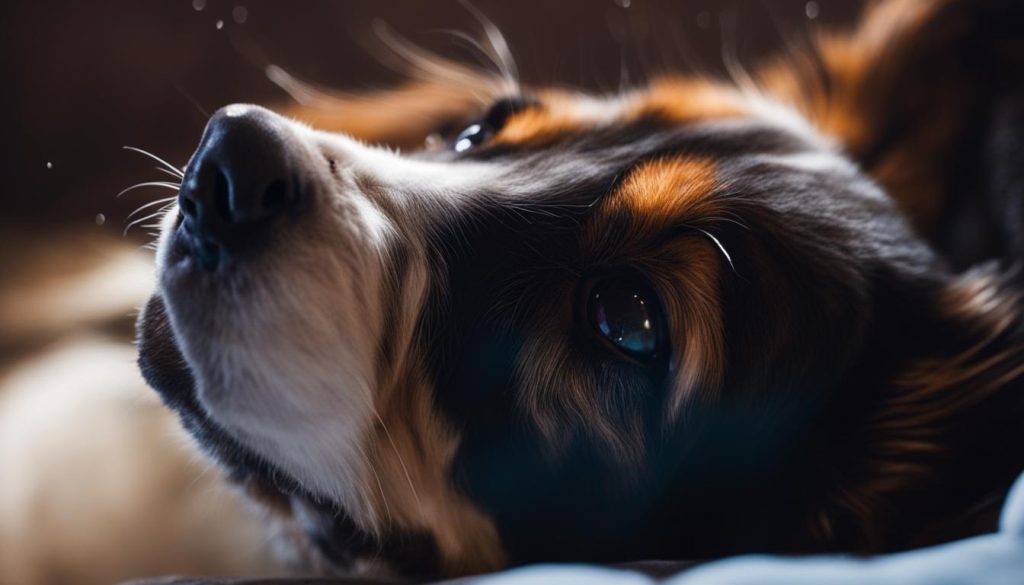
In some cases, excessive licking at night in dogs can become a habitual behavior. Dogs, like humans, are creatures of habit and can develop repetitive behaviors over time. If a dog has been licking their owners excessively at night for an extended period, it may have become their default way of seeking attention or expressing affection. Breaking such habits requires consistent redirection and training.
To address habitual licking, it’s important to redirect the dog’s behavior towards more appropriate alternatives. Providing engaging toys, interactive puzzles, or mentally stimulating activities can help distract the dog from their licking habit. Additionally, positive reinforcement plays a critical role in behavior modification. When the dog exhibits the desired behavior, such as refraining from excessive licking, rewarding them with treats, praise, or playtime can reinforce the new habit.
Creating a structured routine can also help in breaking the habitual licking cycle. Establishing set times for feeding, exercise, and play can provide a sense of security and reduce the dog’s reliance on licking as a means of seeking attention. Consistency and patience are key when working to modify habitual licking behavior in dogs.
Table: Strategies to Address Habitual Licking
| Strategies | Description |
|---|---|
| Redirection | Provide alternative outlets for the dog’s energy and attention, such as engaging toys or interactive puzzles. |
| Positive Reinforcement | Reward the dog with treats, praise, or playtime when they exhibit the desired behavior of refraining from excessive licking. |
| Structured Routine | Establish a consistent schedule for feeding, exercise, and play to reduce the dog’s reliance on licking as a means of seeking attention. |
| Consistency and Patience | It takes time to break a habit, so remain consistent with the training and patient with the progress. |
“Breaking habitual licking behavior in dogs requires redirection, positive reinforcement, and a structured routine. By providing alternative outlets for the dog’s energy and attention, rewarding desired behavior, and establishing a consistent schedule, owners can help their dogs break the habit of excessive licking at night.”
Creating Boundaries and Reinforcement
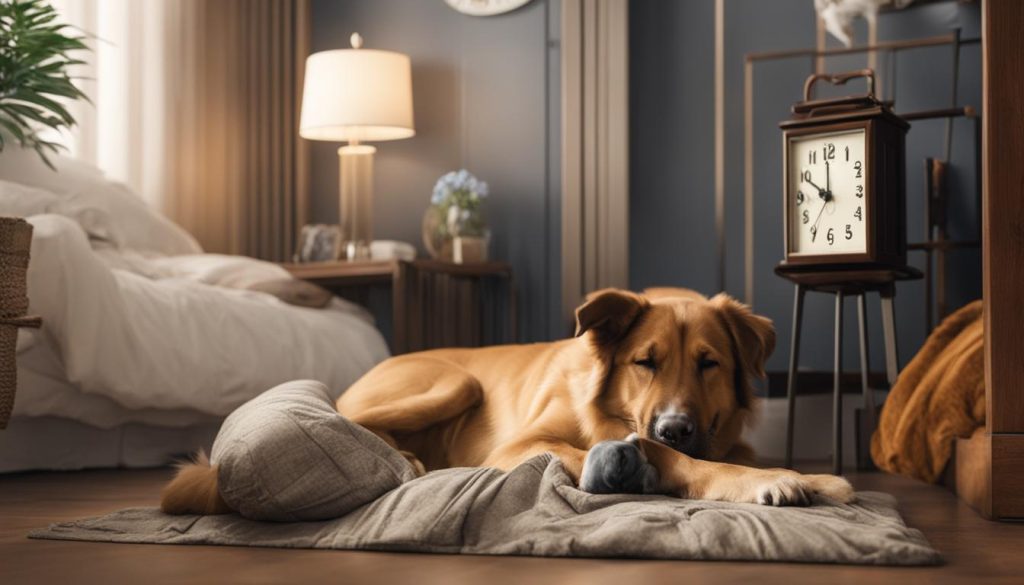
Addressing excessive licking at night in dogs requires the establishment of clear boundaries and the reinforcement of desired behaviors. Consistent training and redirection techniques can help dogs understand appropriate ways to seek attention and show affection.
One effective strategy is to redirect the dog’s focus by providing alternative outlets for their energy and attention. This can involve using interactive toys, engaging in stimulating activities, or providing positive distractions. By offering these alternatives, dogs can learn to redirect their behavior away from excessive licking.
“Consistent training and redirection techniques can help dogs understand appropriate ways to seek attention and show affection.”
It’s important to set consistent guidelines and reinforce desired behaviors. Positive reinforcement, such as praise, treats, or playtime, can be used to reward dogs for displaying appropriate behaviors. This helps them understand which behaviors are desirable and encourages them to repeat those actions.
By creating boundaries and reinforcing positive behaviors, owners can help their dogs understand appropriate ways to interact and show affection without resorting to excessive licking at night. With patience, consistency, and positive reinforcement, dogs can learn to modify their behavior and form healthier habits.
Table: Examples of Reinforcement Techniques
| Techniques | Description |
|---|---|
| Positive reinforcement | Rewarding desired behaviors with treats, praise, or playtime to encourage their repetition. |
| Redirecting attention | Using interactive toys or engaging activities to redirect the dog’s focus away from excessive licking. |
| Consistent training | Establishing clear guidelines and consistently enforcing them through training sessions. |
| Ignoring unwanted behavior | Withholding attention or rewards when the dog engages in excessive licking, discouraging the behavior. |
Medical Considerations
When dealing with excessive licking at night in dogs, it is important to consider that there may be underlying medical issues causing this behavior. While excessive licking can have various motivations, ruling out any potential medical conditions is crucial to ensure your dog’s overall health and well-being.
Common medical causes of excessive licking in dogs include allergies, skin irritations, infections, or even pain. Allergies can lead to itchiness and discomfort, prompting dogs to lick excessively in an attempt to alleviate their symptoms. Skin irritations, such as hot spots or rashes, can also trigger licking as a natural response to soothe the affected area. Infections, especially fungal or bacterial, may cause dogs to lick as a way to clean or relieve discomfort. Additionally, underlying pain or discomfort in joints or muscles can manifest through excessive licking at night.
If you notice that your dog’s licking behavior is persistent, intense, or accompanied by other concerning symptoms such as hair loss, redness, swelling, or changes in appetite or behavior, it is vital to seek veterinary assistance. A veterinarian can conduct a thorough examination, perform necessary tests, and provide appropriate treatment for any underlying medical conditions contributing to the excessive licking behavior.
| Potential Medical Conditions | Symptoms | Treatment |
|---|---|---|
| Allergies |
|
|
| Skin Irritations |
|
|
| Infections |
|
|
| Pain or Discomfort |
|
|
Remember, addressing medical concerns is an essential step in managing excessive licking at night in dogs. By seeking professional veterinary guidance, you can ensure the overall well-being of your furry companion and work towards resolving any underlying medical issues contributing to the behavior.
Redirecting Behavior and Distractions
When dealing with excessive licking at night in dogs, it’s important to find ways to redirect their behavior and provide alternative outlets for their energy and attention. By offering interactive toys, engaging activities, and positive distractions, you can help shift their focus away from excessive licking and towards more appropriate behaviors.
Creating a stimulating and enriching environment for your dog is crucial in promoting healthier behavior patterns. By incorporating activities that mentally and physically challenge them, you can help alleviate their urge to excessively lick at night. This can include puzzle toys, obedience training sessions, or even engaging in interactive playtime together.
In addition to redirecting their behavior, it’s also essential to provide positive reinforcement when they engage in desired behaviors. Rewarding your dog for opting for alternative activities or for refraining from excessive licking at night can help reinforce the desired behavior and discourage the negative behavior.
Remember, consistency is key when redirecting your dog’s behavior. By consistently offering engaging alternatives and rewarding positive behavior, you can help break the habit of excessive licking at night and promote a happier, healthier relationship with your furry companion.
Table: Interactive Toys for Dogs
| Toy Name | Description |
|---|---|
| Interactive Treat Puzzle Ball | A ball-shaped toy that dispenses treats when pushed or rolled, providing mental stimulation and reward for your dog. |
| Hide and Seek Plush Toy | A stuffed animal toy with hidden squeakers that encourages your dog to search for and retrieve the hidden squeakers, providing entertainment and mental exercise. |
| Tug-of-War Rope | A durable rope toy designed for interactive play, providing a physical outlet for your dog’s energy and promoting bonding between you and your furry friend. |
“Redirecting your dog’s behavior and providing interactive toys and activities are effective ways to address excessive licking at night. By offering engaging alternatives and rewarding positive behavior, you can help your dog break the habit and redirect their focus towards healthier activities.” – Professional Dog Trainer
Seeking Professional Help
If your dog continues to exhibit excessive licking behavior at night, despite your efforts to address and modify it, seeking professional help is a recommended course of action. A dog trainer or behaviorist can provide valuable insights, assessments, and customized guidance to help you effectively manage the problem.
Professional experts in dog behavior are trained to analyze and interpret canine behaviors, identifying underlying issues that may contribute to excessive licking at night. Through a thorough evaluation of your dog’s behavior and environment, they can recommend specific strategies and techniques tailored to your dog’s needs.
Working with a professional can often uncover factors or triggers that you may have overlooked, offering fresh perspectives and solutions. They can guide you in implementing behavior modification techniques, redirecting your dog’s focus, and reinforcing alternative behaviors.
Furthermore, professional help can ensure the overall well-being of your dog. Sometimes, excessive licking at night can be a symptom of an underlying medical issue. A behaviorist or trainer can help assess whether there are any health concerns that need to be addressed by a veterinarian.
| Benefits of Seeking Professional Help for Excessive Dog Licking at Night | How to Stop Dog from Licking at Night – Professional Guidance |
|---|---|
| 1. Expert assessment of your dog’s behavior | – Comprehensive behavior analysis |
| 2. Customized guidance and strategies | – Tailored techniques for behavior modification |
| 3. Uncovering overlooked factors or triggers | – Fresh perspectives and insights |
| 4. Identification of underlying medical concerns | – Collaborating with veterinarians, if necessary |
| 5. Ensuring the overall well-being of your dog | – Comprehensive approach to address health issues |
Remember, seeking professional help is not a sign of failure as a dog owner. It shows your commitment to understanding and addressing your dog’s needs in the best way possible. With their expertise and guidance, you can effectively manage and modify your dog’s excessive licking at night, fostering a healthier and happier bond between you and your furry friend.
Wrapping Up
Understanding why dogs lick excessively at night is essential in addressing this behavior effectively. There are several reasons for this behavior, including affection, attention-seeking, grooming instincts, sensory stimulation, stress relief, and habitual patterns. By identifying the root cause, pet owners can implement appropriate strategies to manage and modify their dog’s licking behavior.
To stop a dog from licking excessively at night, it is crucial to provide alternative outlets for their needs. This can include redirecting their attention with interactive toys, engaging activities, and positive distractions. Creating a stimulating and enriching environment for dogs can help them develop healthier behavior patterns.
If attempts at behavior modification do not yield desired results, seeking professional help from a dog trainer or behaviorist is recommended. These experts can assess the dog’s behavior, identify underlying issues, and provide tailored guidance and solutions to manage the problem effectively.
By addressing the underlying causes and implementing appropriate strategies, pet owners can reduce excessive licking at night and strengthen the bond with their furry companions. Understanding the reasons behind this behavior is the first step toward finding solutions and ensuring the well-being of both the dog and the owner.
FAQ
Why does my dog lick me excessively at night?
Excessive licking at night can have various reasons, including affection, playfulness, attention-seeking, grooming instinct, sensitivity to smell and taste, stress relief, or even habitual behavior.
What are the signs of affection and playfulness in dog licking behavior?
Dogs may lick their owners excessively at night as a sign of love and trust, or to seek attention and interaction.
Why does my dog lick me at night to seek attention?
Some dogs have learned that licking brings them praise, petting, or other forms of interaction, so they may engage in excessive licking behavior to get attention from their owners.
Why do dogs lick their owners at night as part of their grooming instinct?
Dogs have an innate grooming instinct, and licking is a natural part of their routine. Licking their owners at night may be their way of establishing a bond and showing care within their social group.
Why do dogs lick their owners’ feet at night?
Dogs are attracted to scents and tastes, including the saltiness in human sweat. Licking their owners’ feet at night may satisfy their taste buds and provide sensory stimulation.
Is excessive licking at night a sign of stress or anxiety in dogs?
Yes, excessive licking can be a self-soothing behavior for dogs experiencing stress or anxiety. It can be similar to how humans engage in nervous habits.
Can excessive licking at night become a habitual behavior for dogs?
Yes, if a dog has been licking their owners excessively at night for a long time, it can become a habitual behavior that requires consistent redirection and training to break.
How can I manage excessive licking at night and set boundaries?
Consistent training, redirection, and rewarding alternative behaviors can help dogs understand appropriate ways to seek attention and show affection. Establishing clear guidelines and providing positive reinforcement are key.
Should I consult a veterinarian if my dog licks excessively at night?
It is important to rule out any underlying medical issues that could be causing discomfort or pain for your dog. Consulting a veterinarian can ensure your dog’s overall health and well-being.
How can I redirect my dog’s behavior and provide distractions from excessive licking at night?
Interactive toys, engaging activities, and positive distractions can help redirect your dog’s focus away from licking behavior. Creating a stimulating and enriching environment promotes healthier behavior patterns.
When should I seek professional help for my dog’s excessive licking at night?
If attempts at behavior modification have been unsuccessful, consulting a dog trainer or behaviorist may provide tailored guidance and solutions for managing the problem effectively.


